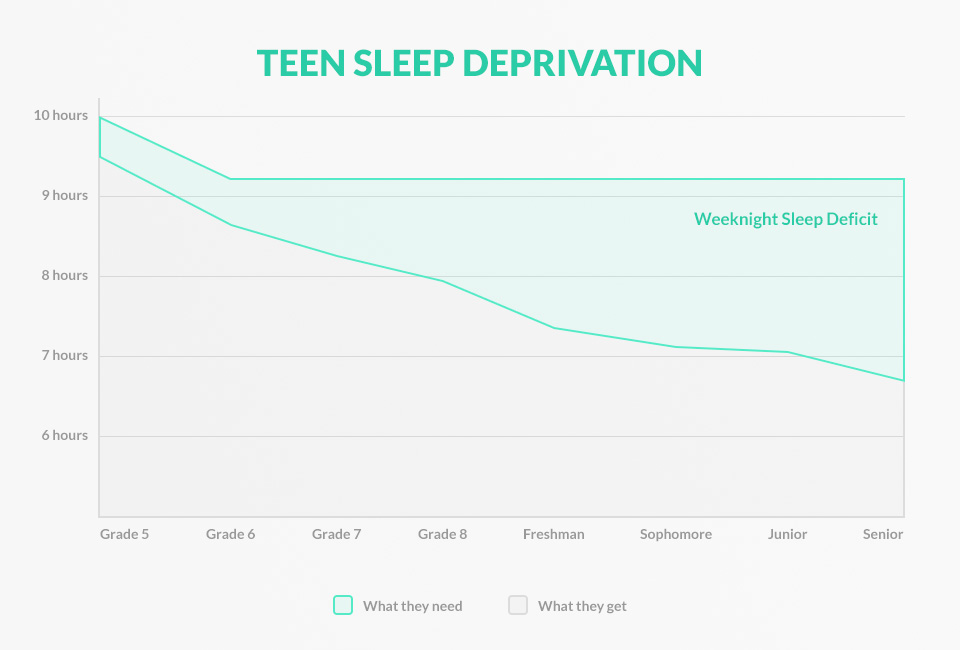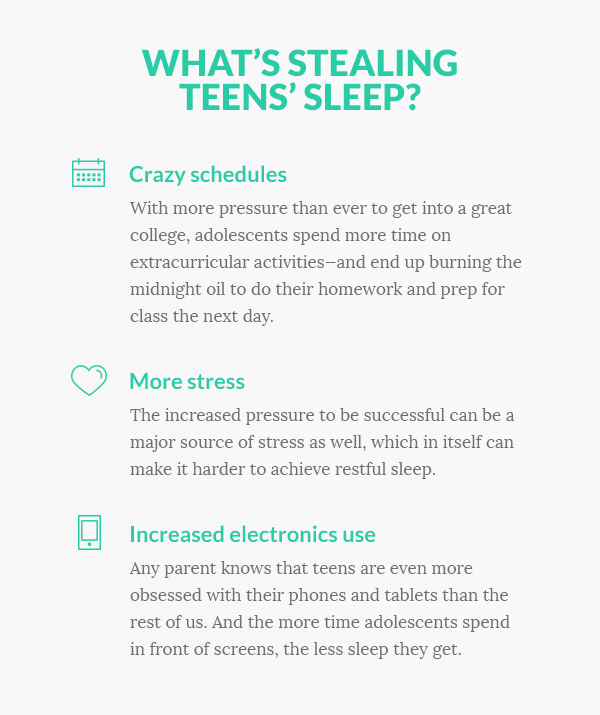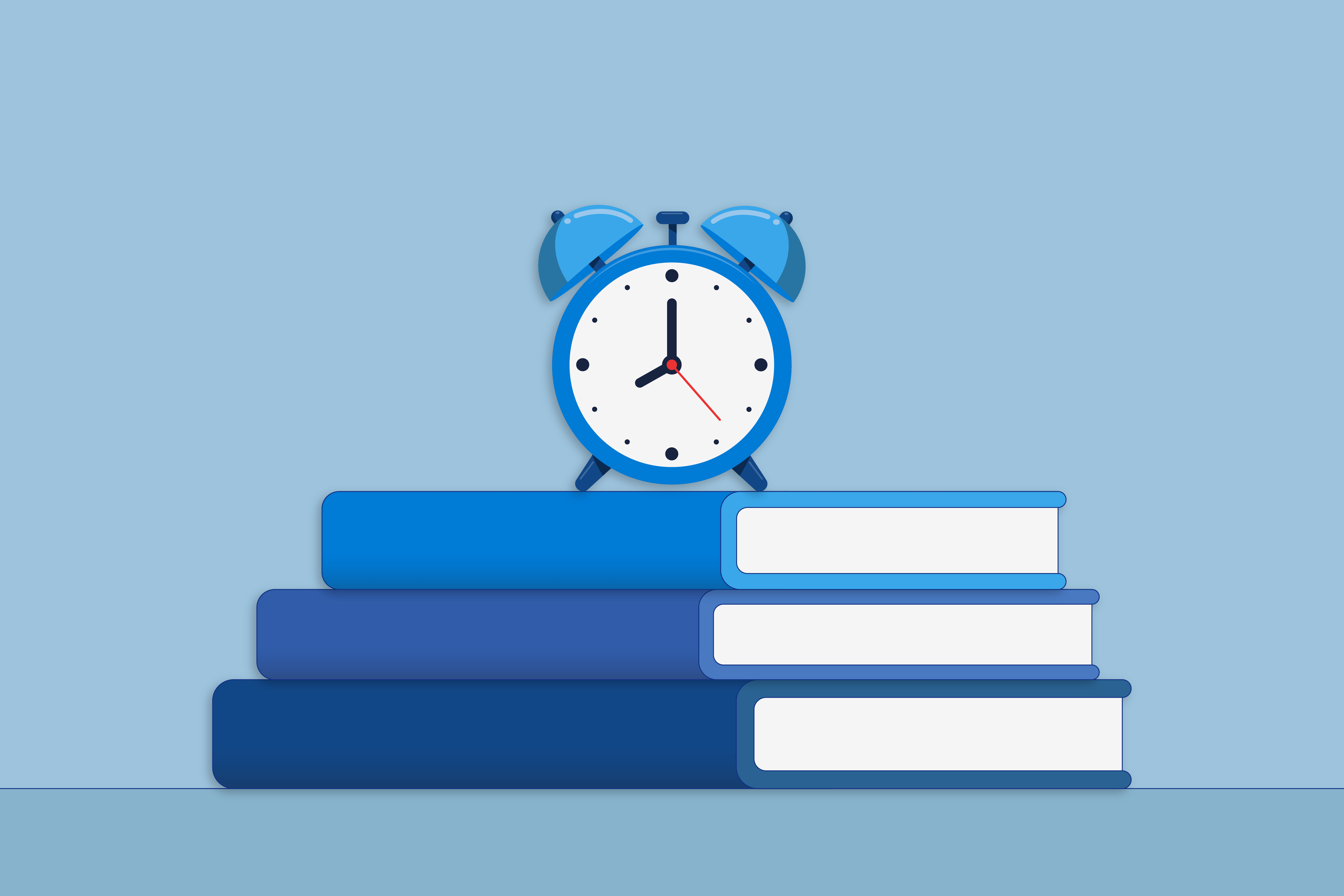If you’re the parent of a teen, it might not come as a surprise to hear that kids these days aren’t exactly doing stellar in the sleep department.
Even though you’re exhausted at the end of a busy day, most adolescents seem perfectly happy to stay up until the wee hours of the morning. Usually, while staring at their phones or playing video games—both of which only end up making it tougher to fall asleep.
Yes, teens are getting less sleep than ever. But it isn’t just their fault. Early school start times, jam-packed schedules, and ever-increasing pressure to get into the best college possible and land a plum job are all making it harder for adolescents to get the sleep their growing bodies so desperately need.
Which, of course, can make your already surly kid even more moody. But when it comes to teen sleep deprivation, a less-than-pleasant disposition is just the beginning. Learn more about what can happen when teens miss out on sleep, plus how to encourage your child to build healthier bedtime habits.
Lots of Teens Are Sleep-Deprived—and The Problem is Getting Worse
Just like grown-ups, teens aren’t getting enough sleep. And the problem is incredibly widespread. Some population-based studies estimate that up to a third of adolescents are logging inadequate snooze time. What’s more, the issue seems to be getting worse.
But teens weren’t always as deep in sleep debt as they are today. In a recent Pediatrics study Verified Source American Academy of Pediatrics (AAP) Professional society for pediatricians that aims to improve children’s health everywhere. View source of nearly 300,000 students in eighth, tenth, and twelfth grades, the percentage of adolescents who got more than seven hours of sleep has declined significantly over the past twenty years.
What’s more, the study found that many of these kids said that they regularly got enough sleep. Which means that even though they think they’re snoozing enough, they’re actually sleep deprived. (One quick way to whether your kid is getting adequate sleep? She’s not hitting the snooze button every morning.)
In fact, even a full seven hours is still pretty far from the amount of sleep that teens should actually be getting. According to the National Sleep Foundation, adolescents need nine hours of sleep per night. Lazy Saturday mornings aside, do you know any teen that sleeps that much?
What’s more, some teens are logging less snooze time than others. The study found that teens really start to skimp on sleep around age 15, and that 18- and 19-year-olds tend to get less sleep compared to their younger counterparts. Girls and ethnic minorities tend to get less sleep than boys, too.

Why Teens Need More Sleep
Just like adults, teens are paying the price for not getting as many hours of sleep as they should. And the consequences of too many late nights and early mornings can be even more serious. Studies show that teens who skimp on sleep are more likely to experience:
- Problems in school. Lack of sleep messes with brain function—and when teens are tired, it’s harder for them to focus and learn in class. Which might be why one recent National Library of Medicine study Verified Source National Library of Medicine (NIH) World’s largest medical library, making biomedical data and information more accessible. View source found that kids who report higher sleep quality tend to earn higher grades.
- Weight gain. Chalk it up to more late nights spent snacking on junk, less energy for exercise, or something else altogether. Sleep-deprived teens are more likely to have higher waist circumferences, according to other NIH research. Verified Source National Library of Medicine (NIH) World’s largest medical library, making biomedical data and information more accessible. View source
- Chronic health issues. One Pediatrics study Verified Source American Academy of Pediatrics (AAP) Professional society for pediatricians that aims to improve children’s health everywhere. View source of more than 70,000 children found that parents of adolescents who miss out on sleep are more likely to say that their teens have skin problems (like eczema) or suffer from frequent or severe headaches.
- Behavior problems. Being overtired might not just put teens in a bad mood—it could actually make them more likely to lash out physically. NIH findings Verified Source National Library of Medicine (NIH) World’s largest medical library, making biomedical data and information more accessible. View source showed that high schoolers who don’t get enough sleep are more likely to engage in violent behavior at school—and even bring weapons to school.
“It is a common observation that teens are sleep deprived,” notes Dr. Nayantara Santhi. “The reasons are many and varied. But sleep loss in adolescents can be serious, since this coincides with their brain development, in particular, the refinement of neural connectivity. This can affect the prefrontal cortex, one of the last brain regions to mature and one that plays a critical role in decision-making, reward processing, social interactions and emotion.”
So What’s Stealing Teens’ Sleep?
First, let’s get one thing straight. Teens have been staying up late since pretty much always. And that’s completely natural. Adolescents’ biological clocks are wired to a later bedtime than adults, so it’s normal for teens to have a tough time falling asleep before 11:00 Verified Source National Sleep Foundation A trusted contributor for medical research. View source —even if you’re ready to conk out by 9:00.
Of course, being wired to fall asleep later wouldn’t be a big deal if teens weren’t also forced to wake up at the crack of dawn for school. But middle- and high school students have been battling these brutal schedules for decades, too.
So what’s causing teens to be especially sleep-deprived today? You might be able to guess some of factors that have turned into major sleep stealers in recent years:
- Crazy schedules. Most teens today have less free time to spend on sleeping compared to teens in the past. With more pressure than ever to get into a great college, adolescents spend more time on extracurricular activities—and end up burning the midnight oil to do their homework and prep for class the next day.
- More stress. More extracurriculars and schoolwork mean that teens can end up having fewer hours for sleep. But it’s more than just a timesuck. The increased pressure to be successful can be a major source of stress as well, which in itself can make it harder to achieve restful sleep.
- Increased electronics use. Any parent knows that teens are even more obsessed with their phones and tablets than the rest of us. And the more time adolescents spend in front of screens, the less sleep they get, found a study published in the British Medical Journal. And it didn’t matter so much whether teens were using their devices before bed. Those who spent more than two hours chatting with friends on their devices were more than three times as likely to log less than five hours of sleep compared to those with less screen time.

How to Encourage Your Teen to Sleep More
Teens think they have it all figured out, so your kid will probably roll their eyes and walk away if you start nagging them about going to bed earlier. So consider taking a different approach.
Start by giving your teen the facts about what happens when they don’t get enough sleep. They’ll feel irritable and moody, potentially fighting with their friends more. They’ll have a harder time paying attention in class, so their grades might be directly affected as well. They might gain weight or generally feel sluggish.
After explaining how too little shuteye is probably making their life miserable, offer some suggestions for how he can get closer to that nine-hour mark more often—like avoiding caffeine late in the day, finding ways to cope with stress, and swapping their smartphone for a book before bed.
Then, let them figure out how to make it work. You might think your teen needs you to help them map out their new sleep plan, but research suggests Verified Source National Library of Medicine (NIH) World’s largest medical library, making biomedical data and information more accessible. View source that they could prove more successful when left to their own devices. When college students were told that they weren’t doing great with their sleep hygiene, those who were left to self-monitor their habits tried to improve the most. Which, for a bunch of adolescent know-it-alls, sounds about right.
In addition to talking with your teen about the risks of sleep deprivation, use this opportunity to ask them about the sleep troubles they have and the reasons they’re feeling so fatigued. If your child struggles to fall asleep or stay asleep, they may have a sleep disorder such as insomnia or sleep apnea. If your child is taking the measures to get the sleep they need, and still waking up feeling groggy and tired, an appointment with a sleep specialist may be necessary.
Lastly, take a moment to assess your child’s mattress. Mattresses should be replaced every seven to ten years, and if you haven’t replaced your child’s mattress since they graduated to their big kid bed, then it’s probably time for an upgrade.
Even if the mattress isn’t showing extremely obvious signs of wear, such as sagging foams or busted innersprings, it can begin to feel lumpy and offer uneven support as time passes. The mere act of replacing your child’s mattress could do wonders for their night’s sleep; just be sure to find the most comfortable mattress for your child’s specific needs.
About the author
Marygrace Taylor is an award-winning health writer for Amerisleep. Her commitment to sleep health is evident in her ability to consistently prioritize eight hours of sleep each night. Her in-depth interviews with industry experts, such as Ken Ceder on "Why Light is Essential for Great Sleep and Optimum Health," highlight her dedication to delivering valuable insights. Marygrace's work has been featured in reputable publications like Business Insider, Glamour, Refinery29, Metro UK, and Hunker, further solidifying her expertise in the field.
View all posts



